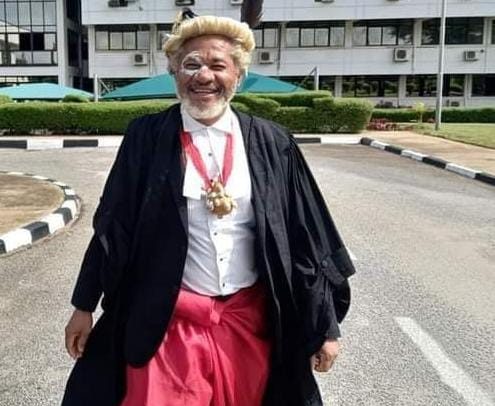
A mild drama played out at the Supreme Court on Thursday, as a frontline human right activist, Chief Malcom Omirhobo, attended proceedings, dressed as a native doctor.
Chief Omirhobo, who sauntered into the courtroom barefooted, wore his lawyer’s wig and black gown with a white shirt, though instead of a black trouser and suit, he wore a red wrapper with a mini-calabash-amulet dangling on his neck.
The lawyer, who also wore amulets on his wrist and ankle, sat comfortably in a row of chairs reserved for legal practitioners while proceedings of the apex court lasted.
Even though he was not accosted by security agents attached to the court, however, his bizarre appearance was not lost on a panel of justices of the Supreme Court that quickly handled the case before them and retired to their chambers.
Speaking to journalists after he exited the courtroom, Chief Omirhobo said his decision to attend the proceeding in what he described as his religious attire, was spurred by the recent judgement of the apex court that permitted the use of head covering veil (Hijab) by female Muslim students in public primary and secondary schools in Lagos.
The activist maintained that the apex court had by the said judgement, enforced his right to freedom of thought, conscience and religion.
He argued that the judgement empowered him to dress in his religious outfit, being his mode of worship, just as the Hijab.
“Even my children will dress like this to the school and I will encourage my fellow traditionalists, those who are serving Olokun, Shongo or Okponor, the god of thunder and the god of iron.
“I encourage them to dress like this because it is always good to be religious. We need to be close to the spirit.
“You can see that I am not wearing shoe.
“Ifa has told me that if I wear shoes I’ll be dead. So I had no option, I had to obey the spirit.
“You see this eye (pointing at the calabash amulet on his chest), without it I can’t see the evil spirit coming to attack me. So with this I can see them.
“So, you see, I have been given licence by judgement of the Supreme Court on Friday (June 17), to dress in our religious outfit because it is the mood of our worship”.
Asked if he was not scared that he could be arrested, Chief Omirhobo, said: “Nobody can do it, nobody! Even the President cannot arrest me. Over my own fundamental right? Nobody can, it’s my fundamental right”.
Asked if he would always wear the religious outfit to court, he said: “Sure! This is my outfit.
“I can stand anywhere, it is my outfit. What is alien? There is no law. Section 45 of the Constitution that delegate the rights in chapter 4 generally, which includes the right to freedom of religion, it’s not clear.
“It says there should be a law that derogate this my right, there is no such law in Nigeria or in the Legal Practitioners Act that tells me how I am going to dress, whether in black and white, there is no law that is stopping me.
“Once there is no law stopping me by virtue of section 45 which says that if there is a law, that such law can override my fundamental right if that law is reasonably justifiable in a democratic society.
“Anyway, there is even no law in the first place! So, there is nothing stopping me”.
Asked what he would do, should the Supreme Court reverse itself, Chief Omirhobo, said: “I am happy with the situation. They should not reverse themselves please”.
On identity of the particular traditional religion he presented before the apex court, he said: “This is Olokun, the god of rivers the god of water. You know I am from Delta State and I am a Chief”.
It will be recalled that a seven-man panel of Justices of the apex court had in a split decision of five to two, last Friday, affirmed an earlier decision of a Court of Appeal in Lagos State that nullified a High Court judgement that banned female students from wearing Hijab with their school uniforms.
The apex court, in its lead majority verdict that was prepared by Justice Kudirat Kekere-Ekun but read by Justice Tijani Abubakar, dismissed as lacking in merit, an appeal Lagos state government lodged against the Court of Appeal decision.
The Supreme Court said it found no reason to reinstate the October 17, 2014 judgement by Justice Grace Onyeabo of the High Court of Lagos State, which upheld the ban on Hijab.
The judgement followed an appeal marked SC/910/2016, which Lagos state, through its Attorney-General, filed against a minor, Miss Ayisat Abdukareem and others.
The Court of Appeal had on July 21, 2016, vacated the High Court judgement that banned the use of Hijab in public schools in Lagos state.
